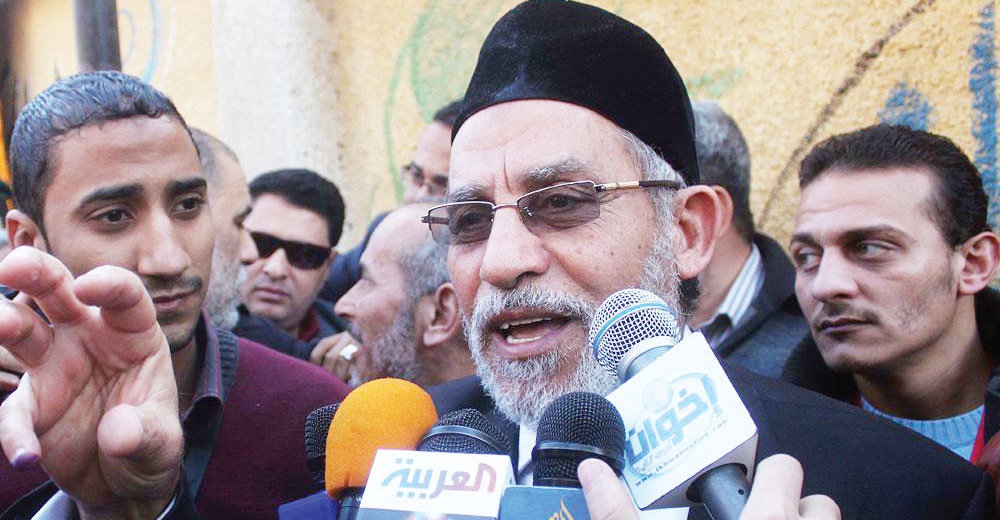
By: Aaron T. Rose
Over one thousand people gathered in Tahrir Square on Wednesday night to listen to a speech by President Mohammed Morsi, in which he deflected criticism of his regime.
“Two and a half hours of a headache,” quipped protestor Emile Azmy, summarising the assessment of the viewing crowd, which was generally animated; people laughed and cursed at the president while watching his lengthy remarks on a projector in the square.
Before the speech began, Mohamed Atef, another protester present, commented on the effect of Morsi’s presidency on the nation, saying, “I used to work in a café called Rehab before the Brotherhood closed it. We did parties, and they said if we want to continue working we have to play Quran. Which is fine, but we can’t have Quran on the entire time.”
Atef, who’s brother died during the first 18 days of the revolution in 2011, said that he hasn’t been able to get married due to financial problems; he supports his family, and since he’s constantly looking for jobs, he doesn’t have enough money to get married.
Atef asked, “One kilogram of potatoes used to cost 1LE, now it costs 4LE. Where do I get this money? Where?”
He added, “There’s no good life, no freedom, no democracy, no food.”
Another protester, who identified himself only as Mohamad, said, “Morsi is threatening the people, and he claims to be a man of religion. Is this what religion says?”
Mohamed claimed that people are eating out of the trash now from how bad the conditions have gotten, adding, “people are dying. If these [poor] people came here, they’d eat the walls.”
Mohamed criticised Morsi’s remarks about Syria, asking “shouldn’t you fix the problems in your own country first before you begin to try fixing other countries’ problems?”
Another protester, who was missing two his fingers, claimed that he only had 25 pounds in his pocket. He said he feeds his mom, wife, and son, surviving off of odd jobs such as painting.
He said, “It just doesn’t bring enough money in anymore. What am I supposed to do? Steal? It’s not my way.”
Atef and Mohamed didn’t expect much from the president’s speech. Mohamed said that Morsi would not leave until all the protesters take to the street and take action.
Atef said, “I’m not leaving the square. Either Morsi leaves, or I will die here.”
As the president’s speech began, people crowded closer to the small projector to listen. As the president starting listing his accomplishments in the country, however, some viewers chanted “liar”, a few raised their middle fingers, and several held their shoes in their hands.
The Ultras soon made themselves noticeable about halfway through the speech, when they performed their signature shaking-hands gesture facing their shirtless leader, known as one of the “cabohat”, who was hoisted upon a supporter’s shoulder. He directed their chants and songs, and the group later sang those that they created during the military junta’s rule, stating that freedom will be achieved no matter what.
Many times during the speech, very loud and strong chants erupted, demanding that Morsi leave office. When the audio feed cut due to technical problems, some responded by chanting, “better!”
Throughout the viewing of the speech in Tahrir, the crowd was over a thousand strong, and although many present cursed the president, others wondered aloud what he was talking about in the first place.
“What is he saying?” A disgruntled looking young man said several times throughout his speech.
Salem, a doctor from the square’s field hospital, said after the speech that he refuses to leave the square, adding that he didn’t pay much attention to the President. “[Morsi] needs to leave. None of our demands have been met, and things are just getting worse.”
One protester said that no one understood anything from the speech except that it’s the 17th of Shaa’ban, the Islamic month that comes before the month of fasting- Ramadan.
Another protester, Atef Naguib, said that a manager of a factory would be embarrassed to give the same speech that the president gave.
“What do Safwat Sherif and all these people he mentioned have anything to do with us? Where are our demands? But the people now know better. This regime is exactly like the old one.”
By 12,30am there were several tents standing, and people were still chanting with the same amount of energy.

